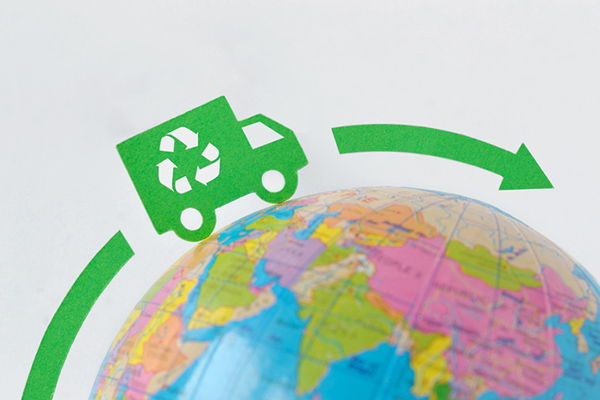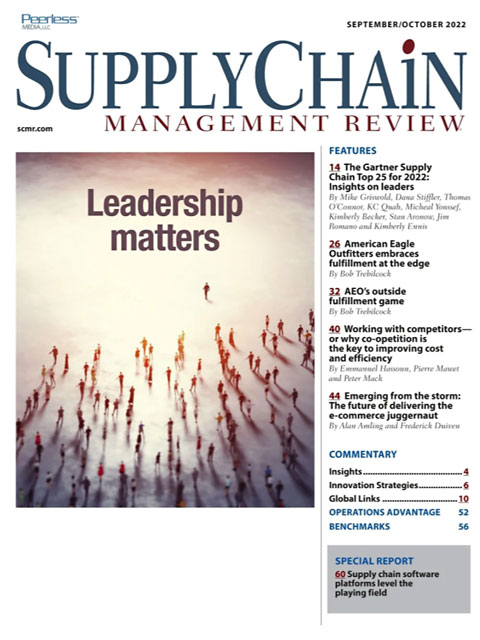Sorry, but your login has failed. Please recheck your login information and resubmit. If your subscription has expired, renew here.
September-October 2022
Once again, it’s time for Gartner’s Top 25 supply chains, the annual list of the 25 supply chains that have made it to the top, plus five Masters that have consistently outperformed year after year. You can read the article, along with some web-only material on scmr.com, to find out what it takes to become a supply chain leader. Last year, I was struck by how the leaders were embracing ESG, or Environmental, Social, & Governance. That has only been reinforced in this year’s report. In fact, ESG has been on the agenda of every event I’ve attended this year, including the keynote address at this year’s ISM conference. Whatever is the… Browse this issue archive.Need Help? Contact customer service 847-559-7581 More options
Many companies are striving to achieve a sustainable supply chain, but how do they know where they stand in reaching this goal? Supply chain sustainability (SCS) is defined in different ways, and as the 2022 State of Supply Chain Sustainability report shows, the definition often comprises multiple components that change over time. Getting a fix on the current status of a company’s efforts to achieve a sustainable supply chain is far from easy.
An approach presented in the above report represents the progression toward sustainability as a staircase of practices. Companies can use the staircase to assess how far their supply chain sustainability efforts have progressed and what the next steps might be.
Companies unbowed by disruptions
The 2022 State of Supply Chain Sustainability annual report is the third in the series co-presented by the MIT Center for Transportation & Logistics and the Council of Supply Chain Management Professionals. This latest report is based largely on a worldwide online survey of practitioners carried out from October 2021 to December 2021. The survey, presented in English, Spanish and Mandarin Chinese, yielded over 3,300 usable responses. The researchers also carried out 15 executive interviews to delve more deeply into the topic.
A notable finding is that interest in SCS remained undiminished even in the face of pandemic-related disruptions. Some 80% of firms continued to pursue their sustainability goals during the COVID-19 pandemic. This willingness to continue supporting SCS reflects a similar finding in the previous year’s report.
This high level of dedication to the SCS cause may seem counter-intuitive given the multiple disruptions that professionals have faced over the last two years or so. A possible reason is that the supply chain function’s newfound notoriety has provided something of a burning platform for SCS. As one interviewee from a third-party logistics firm said: “The visibility and the awareness of the supply chain, and with that the attention that was focused on bringing different solutions to market, gives us the ‘air cover’ that we need to offer things like EVs (electric vehicles) and distributed warehouse solutions.”
It is also apparent that supply chain practitioners are widely involved in sustainability initiatives. This year’s report shows that professionals’ direct involvement in SCS projects is extensive and increasing, and there is more awareness of this work in day-to-day operations.

This complete article is available to subscribers only.
Log in now for full access or start your PLUS+ subscription for instant access.
SC
MR
Sorry, but your login has failed. Please recheck your login information and resubmit. If your subscription has expired, renew here.
September-October 2022
Once again, it’s time for Gartner’s Top 25 supply chains, the annual list of the 25 supply chains that have made it to the top, plus five Masters that have consistently outperformed year after year. You can read… Browse this issue archive. Access your online digital edition. Download a PDF file of the September-October 2022 issue.Many companies are striving to achieve a sustainable supply chain, but how do they know where they stand in reaching this goal? Supply chain sustainability (SCS) is defined in different ways, and as the 2022 State of Supply Chain Sustainability report shows, the definition often comprises multiple components that change over time. Getting a fix on the current status of a company’s efforts to achieve a sustainable supply chain is far from easy.
An approach presented in the above report represents the progression toward sustainability as a staircase of practices. Companies can use the staircase to assess how far their supply chain sustainability efforts have progressed and what the next steps might be.
Companies unbowed by disruptions
The 2022 State of Supply Chain Sustainability annual report is the third in the series co-presented by the MIT Center for Transportation & Logistics and the Council of Supply Chain Management Professionals. This latest report is based largely on a worldwide online survey of practitioners carried out from October 2021 to December 2021. The survey, presented in English, Spanish and Mandarin Chinese, yielded over 3,300 usable responses. The researchers also carried out 15 executive interviews to delve more deeply into the topic.
A notable finding is that interest in SCS remained undiminished even in the face of pandemic-related disruptions. Some 80% of firms continued to pursue their sustainability goals during the COVID-19 pandemic. This willingness to continue supporting SCS reflects a similar finding in the previous year’s report.
This high level of dedication to the SCS cause may seem counter-intuitive given the multiple disruptions that professionals have faced over the last two years or so. A possible reason is that the supply chain function’s newfound notoriety has provided something of a burning platform for SCS. As one interviewee from a third-party logistics firm said: “The visibility and the awareness of the supply chain, and with that the attention that was focused on bringing different solutions to market, gives us the ‘air cover’ that we need to offer things like EVs (electric vehicles) and distributed warehouse solutions.”
It is also apparent that supply chain practitioners are widely involved in sustainability initiatives. This year’s report shows that professionals’ direct involvement in SCS projects is extensive and increasing, and there is more awareness of this work in day-to-day operations.
 SUBSCRIBERS: Click here to download PDF of the full article.
SUBSCRIBERS: Click here to download PDF of the full article.
SC
MR


Latest Supply Chain News
- Three frameworks for creative problem-solving in supply chain
- Mitigating geopolitical uncertainty: 4 essential tactics for industrial CSCOs
- Supply chain strategy for medical devices: A Q&A with industry expert Sanjay Gupta
- Inventory Management and the Supply Chain: Outlook 2025
- How technological innovation is paving the way for a carbon-free future in logistics and supply chains
- More News
Latest Podcast

 Explore
Explore
Topics
Procurement & Sourcing News
- Three frameworks for creative problem-solving in supply chain
- Mitigating geopolitical uncertainty: 4 essential tactics for industrial CSCOs
- Supply chain strategy for medical devices: A Q&A with industry expert Sanjay Gupta
- Inventory Management and the Supply Chain: Outlook 2025
- How technological innovation is paving the way for a carbon-free future in logistics and supply chains
- Parcel shipping spend: The untamed holdout in today’s supply chains
- More Procurement & Sourcing
Latest Procurement & Sourcing Resources

Subscribe

Supply Chain Management Review delivers the best industry content.

Editors’ Picks





